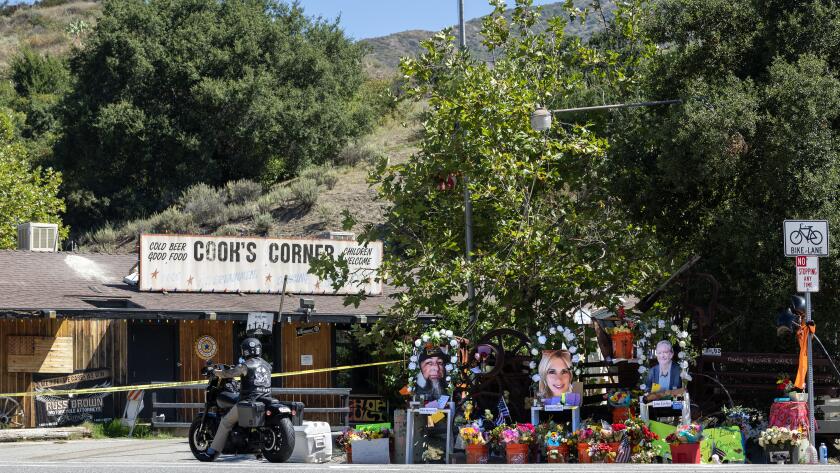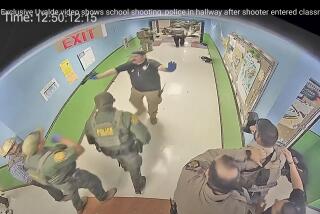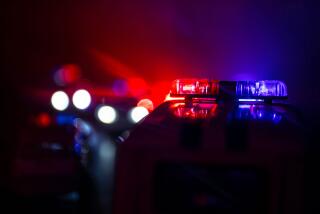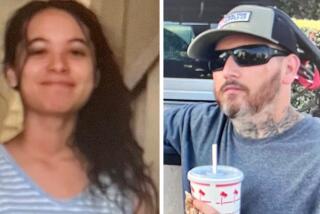‘My buddy just got shot’: Cook’s Corner 911 calls reveal chaos, frantic efforts to save friends
- Share via
More than a week after a former police officer shot nine people at Cook’s Corner in Trabuco Canyon, officials released 911 audio from the incident.
- Share via
“My buddy just got shot, we’re at Cook’s Corner.”
Newly released audio from 911 calls after the mass shooting at the popular Orange County bar captures harrowing moments of the tragedy, with patrons trying to save their friends even as gunfire continues in the background.
The Orange County Fire Authority on Thursday released the audio from three calls.
Shortly after 7 p.m. on Aug. 23, retired Ventura police Officer John Snowling walked into Cook’s Corner armed with multiple firearms. He shot his wife, Marie Snowling, in the face, then fired on eight others — three of whom died — before he was killed by Orange County sheriff’s deputies.
The first caller that night describes a man who has suffered a gunshot wound to his left side. While the dispatcher is still on the phone with the caller, he gets another call from 911 dispatch informing him that there is someone still shooting in the bar.
“So this is an active shooter? All right, we’ll upgrade our response,” the dispatcher says.
The victim’s pained moans can be heard in the background as the dispatcher instructs the caller to cover the wound with a clean cloth or T-shirt.
“He says he can’t breathe,” the caller says, his voice measured but tense. “Hold on, the guy’s still shootin’.”
The last minute of the call includes an audible series of gunshots in the background, possibly from the shooting of John Snowling by deputies. The last thing the caller says is, “The cops are here.”
On the night of the shooting, Orange County Undersheriff Jeff Hallock said the whole incident, from initial 911 call to deputies shooting Snowling, occurred within the span of several minutes. The audio illuminates the chaos of those moments and the ones that followed as people sought help and tried to render aid to victims.
The second call begins with gunshots audible in the background as a dispatcher connects with another bystander tending to the same victim.
The caller says the victim is seated under a concrete retaining wall, sheltering from gunfire with a gunshot wound to his left side. The dispatcher asks if the victim is breathing normally and how much blood has been lost.
“He’s conscious,” the caller says. “He’s in a lot of pain.”
The dispatcher then asks for details from the scene, including how many gunshot victims there are and what the suspect looks like. The caller describes Snowling as a white man in his 50s wearing a dark-colored baseball cap, a button-up T-shirt or polo shirt and blue jeans.
“Well, here’s the problem: They’re not going to walk down here while there’s active gunfire,” the caller says about the arrival of paramedics after a series of gunshots is heard.
The call ends with the man deciding to carry the victim out to receive medical aid.
In the final call, the caller is described by a dispatcher as someone “helping with the wounded.” But the line is open and all that can be heard is chaotic noise and shouting.
The dispatcher says, “Hello, can you hear me? Hello?” but gets no response.
Sounds from the scene are heard over the line: a cacophony of voices, a man demanding help with tending to the wound of one of the victims.
Then, two minutes into the call, there are gunshots. A minute later, more gunshots. Then the call ends.
More to Read
Sign up for Essential California
The most important California stories and recommendations in your inbox every morning.
You may occasionally receive promotional content from the Los Angeles Times.












